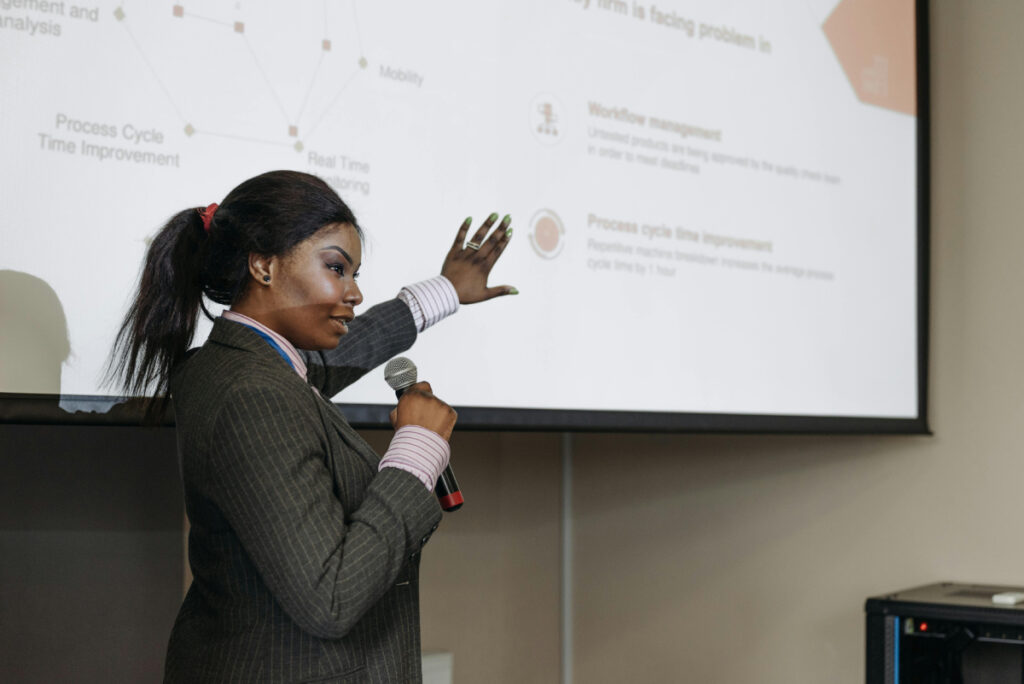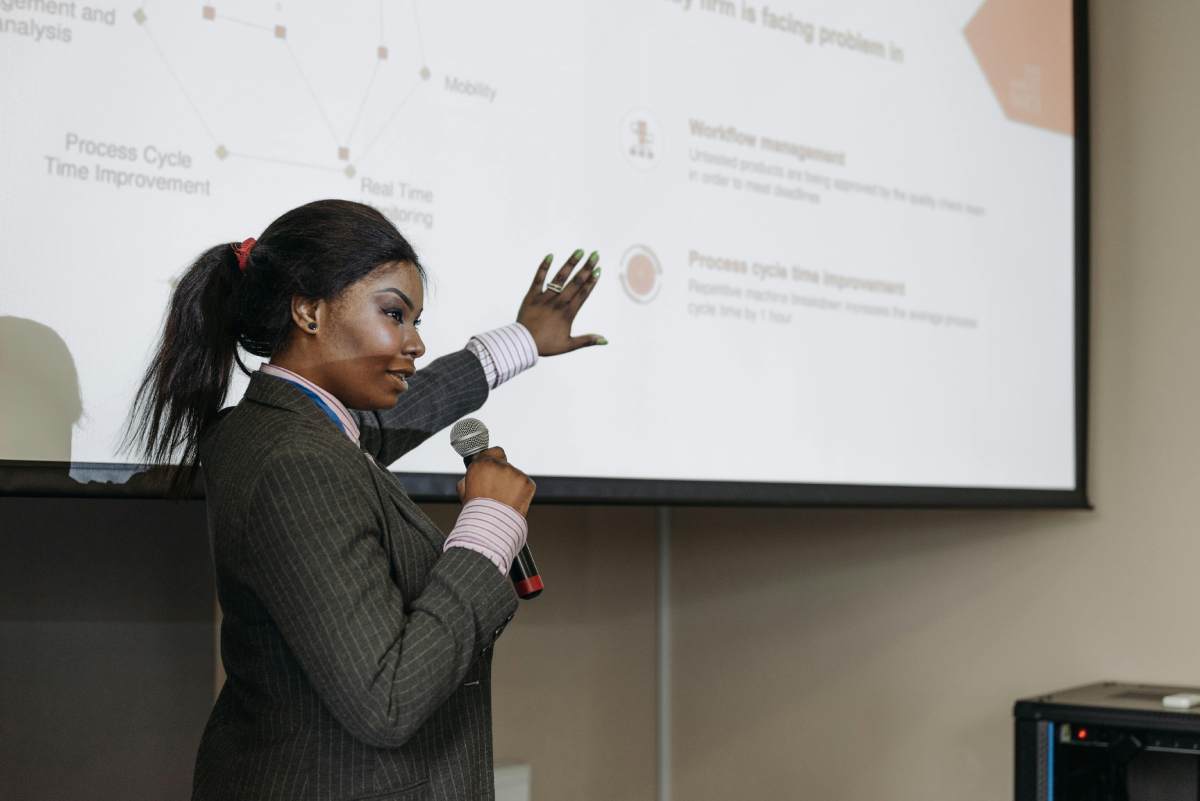Have you ever been captivated by someone who seemed to command the room effortlessly? They didn’t need loud gestures or overly rehearsed lines. Their presence alone made you stop, listen, and feel. That’s the power of presence a quality that transforms leaders into trusted influencers and speakers into unforgettable communicators.
Presence isn’t just about being seen or heard but about feeling. The intangible quality makes people lean in when you speak, believe in your message, and trust in your leadership. As someone who’s spent decades guiding people in their personal and professional relationships, I’ve seen how presence can elevate your career and your ability to inspire and connect.
In this post, I’ll explore how to cultivate this vital skill, why it matters so much for leaders and speakers, and the steps you can take to embody the kind of presence that builds trust and influence on any stage.
What Does Leadership Presence Mean?
Leadership presence isn’t about perfection but authenticity, confidence, and emotional connection. How you make others feel in your presence defines your ability to lead.
Think about the leaders or speakers who’ve left a lasting impression on you. Chances are, it wasn’t just their credentials or their perfectly crafted speeches. It was their ability to create a sense of trust, hold space for their audience, and communicate with authority and empathy.
Presence is a blend of inner confidence and outward awareness. It’s rooted in being fully engaged in the moment, reading the room’s energy, and responding authentically. When you cultivate presence, you’re not just speaking but connecting.
Why Presence is the Foundation of Trust and Influence
- Presence Builds Trust:
People trust leaders who are fully present. When genuinely engaged, you signal that you value your audience’s time and perspective. Trust is built through your words and body language, eye contact, and the energy you bring to the room.
I remember coaching a client preparing for a high-stakes keynote. Her intention of working with me was to learn how to connect and be relatable. She had all the data and polished slides, but something needed to be added. Her delivery felt distant. Everything shifted once we worked on helping her stay grounded and fully present with her audience. She didn’t just share information, she shared herself. That authenticity made her message resonate deeper, and her audience trusted her because they felt seen and valued. - Presence Inspires Action:
A commanding presence can move people to take action. When you’re fully engaged, your passion becomes contagious. People are drawn to leaders who make them feel energized and understood. Presence gives weight to your words and inspires your audience to believe in your vision.
Steps to Cultivate Presence as a Leader and Speaker
1. Be Fully Present in the Moment
Presence begins with mindfulness. It’s a necessary preparation I do each and every time I have an important message to convey. When preparing to lead or speak, I clear my mind of distractions and focus entirely on the task at hand. Before stepping onto a stage or into a room, I take a deep breath, ground myself, and commit to fully engaging with my audience.
I set a simple intention: “I’m here to connect, inspire, and listen.” This mindset shift can be transformative. People can sense when you’re distracted or simply going through the motions. By being present, you show that you care, and that care fosters trust.
2. Master the Art of Listening
Leadership isn’t just about speaking; it’s about listening. Whether in a boardroom or on a stage, pay attention to the subtle cues from your audience—their body language, energy, and reactions. Listening doesn’t just mean hearing words; it means understanding the emotions behind them. If you’re paying attention, you’ll see who in your audience is delighted, tuned in or tuned out. WIth this level of listening, you can literally move your audience to deeper place of hearing and understanding you. It allows you to ability to pivot and I dare say, improvise a bit to inspire attention.
I once worked with a team leader who struggled to connect with her employees during presentations. She focused so much on her message that she missed the energy in the room. When we worked on active listening—pausing to invite feedback, acknowledging emotions, and responding authentically—her team became more engaged, and her influence grew.
3. Embrace Vulnerability
True presence requires vulnerability. Sharing your challenges and failures doesn’t make you weak—it makes you human. Audiences relate to leaders who are willing to be open about their journey. Vulnerability creates an emotional connection that makes your message unforgettable.
In one of my keynotes, I shared a personal story about overcoming a challenging time in my life. I didn’t focus on the story itself, but rather the emotions of my story. In this way, I became more relatable to everyone in the room, even those who didn’t share my journey. The room shifted. People leaned in because they saw themselves in my story. Vulnerability isn’t oversharing; it’s about showing that you understand the challenges others face because you’ve been there, too. At least, from an emotional perspective. We all can’t relate to one another’s stories, but we can all relate to fear, desire, loss, love, disappointment and heartache.

Balancing Confidence and Approachability
One of the greatest challenges for leaders is striking the balance between confidence and approachability. Just like in dating, confidence earns respect, but approachability builds relationships. Together, they create a powerful presence that inspires trust.
Confidence Tips:
- Stand tall, pull your shoulders back and make eye contact with as many people in the room as possible.
- Plan to connect and know you have something valuable to share.
- Focus on your message, not perfection—authenticity matters more than flawless delivery.
Approachability Tips:
- Smile genuinely and engage with your audience as individuals, not a faceless crowd.
- Use inclusive language that invites participation and collaboration.
- Be humble and real. You’re there to share, not teach.
Remember, the most impactful leaders can command attention while making others feel valued.
The Role of Emotional Intelligence in Presence
Presence is deeply tied to emotional intelligence. Your ability to understand and manage your emotions—and empathize with others—sets you apart as a relatable leader.
Key EI Practices for Presence:
- Self-awareness: Recognize your strengths and blind spots.
- Empathy: Show genuine concern for the feelings and perspectives of your audience.
- Emotional regulation: Stay calm and composed, even under pressure.
- Honesty: If you’re nervous, share it instead of trying to cover it up. It’s this level of vulnerability that allows people to see the real you.
When you lead with emotional intelligence, your presence becomes magnetic. People are drawn to leaders who demonstrate empathy and understanding. Connection is the cornerstone of everything we do in life. In the field of matchmaking, we know that two compatible people on paper don’t necessarily translate to a great date. When we skip the vital aspect of creating connection, we miss the foundation that builds lasting and powerful relationships.
The Ripple Effect of Presence
Cultivating presence doesn’t just impact your audience—it transforms your entire leadership style. Teams become more engaged, trust deepens, and communication flows more freely. Presence is a skill that continues to evolve, and the more you practice it, the more influential you become.
Conclusion: The Power of Presence is Within You
The power of presence isn’t reserved for a select few—you can develop and refine with intention. You create connections far beyond the stage or boardroom when you show up fully, lead with empathy, and balance confidence with approachability.
Presence isn’t just about being remembered it’s about leaving a legacy of trust, inspiration, and meaningful impact. As you continue your journey as a leader or speaker, I encourage you to practice being present in every moment. Your audience and your team will thank you.
If you’re curious about how your leadership presence resonates, take my Relatability Assessment. It’s a fantastic tool to uncover your strengths and learn how to connect even more deeply with those around you.























